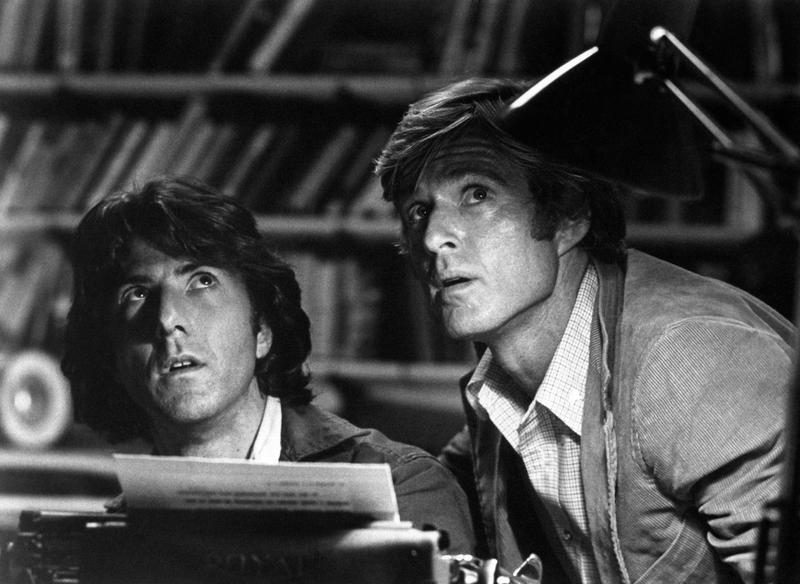BROOKE GLADSTONE: So you just heard about all the bogus conspiracies swirling around the real one in plain sight, that the very rich prevail on our institutions to create loopholes, so they conduct the rules the rest of us have to follow. History runneth over with real conspiracies. Watergate, for instance, was famously broken by Woodward and Bernstein of the Washington Post. In fact, there’s a weird Watergate connection to the Panama Papers. It turns out that the unrecovered proceeds from the notorious 1983 Brinks MAT heist at London's Heathrow Airport – I mean, over 100 million bucks in gold, diamonds and cash - were laundered through a shell company protected by Mossack Fonseca, which ultimately sought help from another Panamanian firm run by Gilbert Straub, who claims to have funneled $50,000 to the Watergate burglars.
I just mention it because it's the 40th anniversary of the movie, “All the President’s Men.” Robert Redford played Bob Woodward.
[CLIP]:
ROBERT REDFORD AS BOB WOODWARD: I’m Bob Woodward of the Washington Post.
[COURTROOM HUBBUB]
ATTY. MARKHAM/CADDY: Markham.
BOB WOODWARD: Markham? Mr. Markham, are you here in connection with the Watergate burglary?
ATTY. MARKHAM/CADDY]: I’m not here.
[END CLIP]
BROOKE GLADSTONE: That exquisite film, also starring Dustin Hoffman as Carl Bernstein, is probably the prevailing symbol of all that is fine in American journalism. It's based on the book of the same name by Woodward and Bernstein. The DVD, which was released in 2006 to mark the anniversary, included a commentary which revealed that they intended to write a very different kind of chronicle, one that anatomized the Watergate affair dispassionately and impersonally. But then a call came from an entirely unexpected quarter. Here’s Carl Bernstein.
[MUSIC UP & UNDER]
CARL BERNSTEIN: Woodward came up to me one day and said he’d gotten a call from Redford and I said, what the hell about? And he said, well, he, he thinks the story is really us. And, at the time, we were still reporting the story, and we sure didn’t think the story was really us.
BOB WOODWARD: It was helpful, to me, to hear him say that.
BROOKE GLADSTONE: Bob Woodward.
BOB WOODWARD: Then in the end we wound up writing All the President’s Men as a reporting story. He laid the seed for that in that first phone call.
BROOKE GLADSTONE: Robert Redford.
ROBERT REDFORD: I loved the idea of the fact that these guys were doing this hard work from the lowest rung of the professional ladder in their business and that their work would lead to the takedown of the highest office in the land.
BROOKE GLADSTONE: So there you have it, the emblem of investigative journalism in the days before big data. For many, perhaps most Americans, the story of Watergate is just as much about the potential power of gumshoe reporters as it is about the corruption of a president, and it’s shaped our perceptions, our expectations of journalism even more than our view of the presidency. It’s the icon of the fourth estate. It’s the flag that wraps around itself when the arrows fly. And the Betsy Ross who stitched that flag for future generations of news reporters and news consumers wasn't the duo known as “Woodstein.” It was Robert Redford.
[“TURNAROUND" BY ORNETTE COLEMAN/MUSIC UP & UNDER]
BOB GARFIELD: That’s it for this week show. On the Media is produced by Kimmie Regler, Meara Sharma, Alana Casanova-Burgess and Jesse Brenneman. We had more help from Dacha Lisitsina and David Conrad, and our show was edited - by Brooke. Our technical director is Jennifer Munson. Our engineer this week was Casey Holford.
BROOKE GLADSTONE: Katya Rogers is our executive producer. Jim Schachter is WNYC’s vice-president for news. Bassist composer Ben Allison wrote our theme. On the Media is a production of WNYC Studios. I’m Brooke Gladstone.
BOB GARFIELD: And I’m Bob Garfield.


